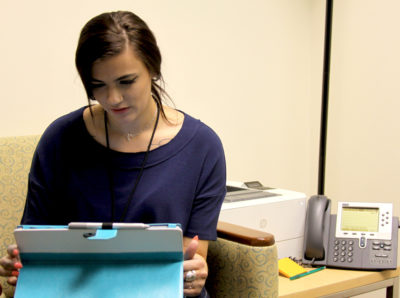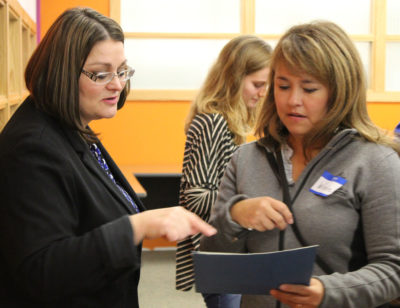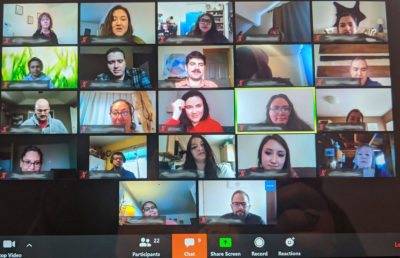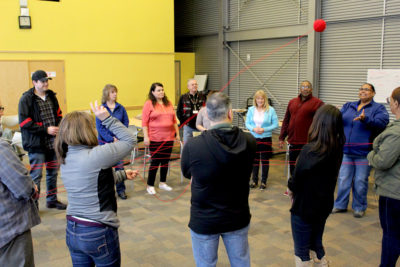Thanks to their emergency planning in the wake of an earthquake, ANJC hit the ground running in response to COVID-19
In the wake of the November 2018 earthquake, staff at the Alaska Native Justice Center (ANJC) put together an emergency response plan. The plan, based on their response to the earthquake and discussions around what worked and what didn’t, was meant to be a precaution — something to rely on in the unlikely event that the organization might face another major disaster.
Enter the novel coronavirus.
Thinking Ahead

Within days of CITC’s leadership announcing that all non-essential staff from both CITC and ANJC should work remotely to protect themselves and program participants from the spread of COVID-19, 100 percent of ANJC’s employees were up and running their programs from home. Thanks to their experience bouncing back from the earthquake, ANJC staff knew exactly how to transition to a new work environment in the midst of an emergency.
“We were fortunate to be thinking ahead as a group,” said Tammy Ashley, ANJC Director of Operations. “Because we had talked so openly about our emergency plan, everyone knew exactly what to do. They got right to work. Our priority was to keep our staff working, and to keep our participants connected.”
One key part of the transition to remote work was laptops: All ANJC employees use laptops for their day-to-day work, a trend that was started with a donation of twelve laptops from the Rasmuson Foundation. As soon as the hunker-down order was issued, said Tammy, “I told everyone to grab their laptops and power cords, everything they needed, and start working from home.”
Staying in Touch
It’s one thing to attend Zoom meetings with your colleagues from home, though. It’s another to serve the people who rely on your programs to meet their needs.
Senior Program Manager Marlene Mack knew that the individuals she serves — victims of domestic violence, sexual assault, and human trafficking — would need ANJC now more than ever. “Our first concern was safety, and that victims could report abuse appropriately,” Marlene explained. “In addition, some of our participants work in the beauty industry and lost jobs when businesses shut down.”

ANJC’s Domestic Violence, Sexual Assault, & Human Trafficking Advocacy team not only immediately began checking in with participants over the phone, but set up a system through which participants could request groceries and other items. After assessing each family’s needs, ANJC advocates place orders online, then organize safe, contact-free delivery to participants. Advocates also distributed gift cards to help with transportation needs.
“I’m proud and humbled by my staff and their dedication to assisting our participants remotely,” Marlene said.
Under normal circumstances, ANJC offers civil legal attorney representation or pro se advocacy assistance for victims of domestic violence, sexual assault, human trafficking, and stalking — which they are continuing to do, though not without challenges.
“A lot of court hearings have been suspended, so we’re helping participants with the rescheduling process,” Marlene explained. “For some hearings, like those that are emergencies or involve children, ANJC advocacy staff is able to attend and support participants telephonically. My heart just goes out to our participants. It’s a stressful situation, and they don’t have that human connection we’d usually be able to provide in person during that process.”
Thanks to a donation from GCI, however, advocates and other staff are able to keep in touch with their participants using a number of “burner” phones, which were first used by ANJC case managers; once ANJC moved to using Zoom for meetings and appointments, the phones were distributed to participants.
Remote Representation

Delivering services by phone is status quo for ANJC’s legal team, which offers technical assistance, training, and consultation on Indian Child Welfare Act (ICWA) cases to Tribes across the state. But ANJC’s lawyers have also had to adjust to the new normal.
“While many court hearings were suspended, domestic violence protective orders and many ICWA child-in-need of aid hearings have not,” said ANJC’s Legal and Policy Director Alex Cleghorn. “So our team is now filing court documents by email and fax and appearing in court over the phone and by video conference.”
The legal team also hosted a roundtable for tribal partners using the online meeting platform Go To Meeting, answering questions about new court rules and offering guidance. The team is also strategizing ways to hold conferences and trainings that have now been canceled but could potentially happen via webinar or other methods.
“Our team has displayed incredible flexibility,” Alex shared. “Their commitment to provide the best service possible continues to shine through. When the shelter-in-place order was given, there was no question from them over whether we would continue to appear in cases; they immediately started figuring out how they would continue to support our participants and serve our clients.”
Getting Creative

Program Manager Justin Hatton faced a quandary: How to keep two grant-funded youth programs alive without actually meeting with young people?
Technology Zoomed to the rescue again. Youth advocates partnering with Big Brothers, Big Sisters Alaska began meeting with “littles” and their families using the online video conferencing tool. Meanwhile, Justin’s team is creating and delivering activity kits to McLaughlin Youth Center (MYC). MYC participants will meet with ANJC advocates on Zoom to do cultural activities, like beading and drum building, and receive education on topics like healthy relationships.
“It’s great to connect with them virtually, plus it’s showing us other opportunities we might have,” Justin revealed. “For instance, going forward, we could use a platform like Zoom to connect with rural areas and bring village youth the same instruction and activities we provide locally. It could allow us to reach even more participants across the state.”
Zoom has also enabled ANJC’s Recovery and Reentry team to maintain contact with their participants. Reentry Case Manager Benjamin Briggs held crash courses on how to use Zoom use with the folks in his support groups, then continued to hold meetings every Monday and Wednesday, along with one-on-one meetings to continue case management.
Like the Advocacy team, Reentry staff is also providing food and other assistance to those who have lost jobs or need support.
“We had a passion to get our participants the services they need, and we got creative,” Justin summed up.
A Plan for Staying Strong
“We learned a lot from the earthquake. We bounced back quickly then, but it was chaotic,” Tammy recalled.

To prevent that same chaos in the coronavirus response, ANJC managers created task lists to ensure that workloads were evenly distributed. They also created opportunities for professional growth, allowing staff to set aside one hour each workday to take a class or develop new office skills.
ANJC also launched a “Get Up, Get Out, Get Active” program that grants each employee 30 minutes a day to get away from the computer and go for a run, walk the dog, play in their yard with their kids, or do another activity. Employees use the ANJC private Facebook group to log their activities and share photos.
“In this time of economic uncertainty, we’re all lucky to be able to keep working,” Tammy reflected. “That’s the bottom line: keeping our employees paid, busy, and valued, and staying connected with our participants. We worked really hard to get the ANJC team to where it is now. The best thing we’ve done as a team is create a plan for staying strong through anything that gets thrown our way.”
ANJC’s offices are closed, but staff continues to provide remote services for participants and others. Connect with ANJC on Facebook, or learn more about ANJC services at anjc.org.
